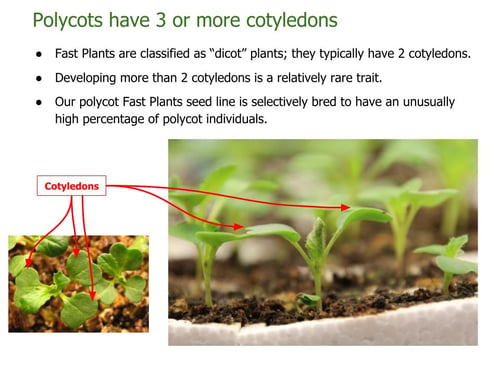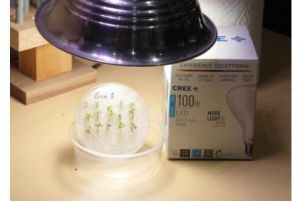
Fast Plants in our new Polycot seed stock display a trait that students easily notice and tend to be curious about (much like four-leaf clovers catch attention). In addition, the polycot trait appears to be determined by genetics with little or no environmental influences (as far as we understand it after 10 years work). So, this new seed line offers a strong alternative to "hairs" or trichomes as a trait for selection experiments (for example, in the AP Biology selection investigation).

We're also extra-enthusiastic about Polycots because cotyledons can be observed in very young seedlings; therefore, distinguishing and counting dicots and polycots can be done in a young population during the first week after planting or germinating on paper towel. Also, after years of work, we developed a method for producing at scale both Generation 1 Polycot seed stock (with ~25% polycotyledons) and Generation 2 (aka the offspring of polycots selected from Generation 1). Generation 2 seed stock expresses the increased frequency that is typical from polycot selective breeding (~45% polycotyledons). As a result of being able to offer packets of both Generation 1 and Generation 2 Polycots through Carolina Biological, it is now possible to choose to teach an abbreviated selection investigation option. So, depending on your situation, you may choose to:
- Implement a full selection and breeding investigation in which students select only the polycot individuals from Generation 1, grow them through flowering, pollination, and seed development to produce viable Generation 2 seeds, or
- Use an abbreviated version of the investigation by purchasing Generation 2 seeds for use in a way similar to what is featured in our selection blog post and Open Source Selection Investigation lesson.
 See More Fast Plants Newsletter
See More Fast Plants Newsletter